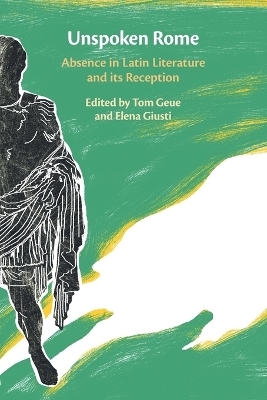
Unspoken Rome
Cambridge University Press (Verlag)
978-1-108-82331-9 (ISBN)
Latin literature is a hotbed of holes and erasures. Its sensitivity to politics leaves it ripe for repression of all sorts of names, places and historical events, while its dense allusivity appears to hide interpretative clues in a network of texts that only the reader's consciousness can make present. This volume showcases innovative approaches to the field of Latin literature, all of which are refracted through this prism of absence, which functions as a fundamental generative force both for the hermeneutics and the ongoing literary aftermath of these texts. Reviewing and working with various influential approaches to textual absence, the contributors to Unspoken Rome treat these texts as silent types, listening out for what they do not say, and how they do not speak, whilst also tracing the ill-defined borders within which scholars and modern authors are legitimized to fill in the silences around which they are built.
Tom Geue is Lecturer in Latin at the University of St Andrews. He is the author of Juvenal and the Poetics of Anonymity (Cambridge, 2017) and Author Unknown: The Power of Anonymity in Ancient Rome (2019). He is usually away from home. Elena Giusti is Associate Professor in Latin Language and Literature at the University of Warwick. She previously taught Classics at the Universities of Glasgow and Cambridge, where she was Research Fellow in Classics at St John's College. She is the author of Carthage in Virgil's Aeneid (Cambridge, 2018).
Introduction Tom Geue and Elena Giusti; Part I. Absence in Text: 1. Catullus' Sapphic lacuna: A Palimpsest of Absences and Presences Ábel Tamás; 2. Speaking Aposiopeseis: The (Generic) Sound of Silence in Statius' Thebaid Stefano Briguglio; 3. Allegorical Absences: Virgil, Ovid, Prudentius and Claudian Philip Hardie; 4. Tamen Apsentes Prosunt Pro Praesentibus: Proxied Absences and Roman Comedy Giuseppe Pezzini; 5. Absence Left Wanting: The Groove in Ovid's Remedia Victoria Rimell; 6. The Gaze on the Void: Hermeneutic Responses to Dido's First Appearance Viola Starnone; Part II. Absence in Context: 7. Speaking Silence in Cicero's Brutus and Tacitus' Dialogus de Oratoribus Kathrin Winter; 8. Et Sine Auctore Notissimi Uersus: Unauthored Poetry and Rome's Authoritative Turn Barbara Del Giovane; 9. Looking for the Emperor in Seneca's Letters Catharine Edwards; 10. Marcus Aurelius: Medi()ations not Medi(c)ations John Henderson; 11. Lost in Germania: The Absence of History in Tacitus' Ethnography James Mcnamara; 12. Conspicuous Absence: Tacitus' de Re Publica Ellen O'gorman; Part III. Going Beyond: 13. The Slave, Between Absence and Presence William Fitzgerald; 14. In Search of the Lost City: The Enduring Absence of Pompeii Joanna Paul; 15. Omnibus Umbra Locis Adero: Elena Ferrante and the Poetics of Absence Francesca Bellei; 16. The Philology of Grief: Catullus 101 and Anne Carson's Nox Erik Fredericksen; 17. Absence, Metaphysically Speaking: From Reception to Instauration? Duncan Kennedy; 18. Afterword: Lights Out Emily Gowers.
| Erscheinungsdatum | 20.03.2023 |
|---|---|
| Zusatzinfo | Worked examples or Exercises |
| Verlagsort | Cambridge |
| Sprache | englisch |
| Maße | 152 x 229 mm |
| Gewicht | 630 g |
| Themenwelt | Geisteswissenschaften ► Archäologie |
| Geschichte ► Allgemeine Geschichte ► Vor- und Frühgeschichte | |
| Geschichte ► Allgemeine Geschichte ► Altertum / Antike | |
| Geisteswissenschaften ► Sprach- / Literaturwissenschaft ► Anglistik / Amerikanistik | |
| Geisteswissenschaften ► Sprach- / Literaturwissenschaft ► Literaturwissenschaft | |
| ISBN-10 | 1-108-82331-9 / 1108823319 |
| ISBN-13 | 978-1-108-82331-9 / 9781108823319 |
| Zustand | Neuware |
| Haben Sie eine Frage zum Produkt? |
aus dem Bereich


